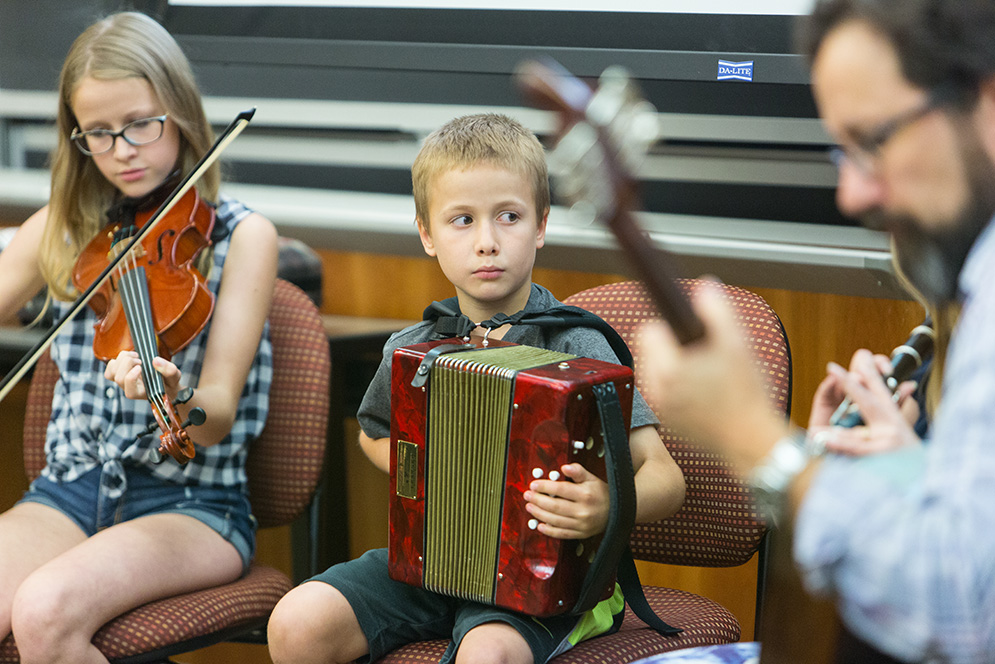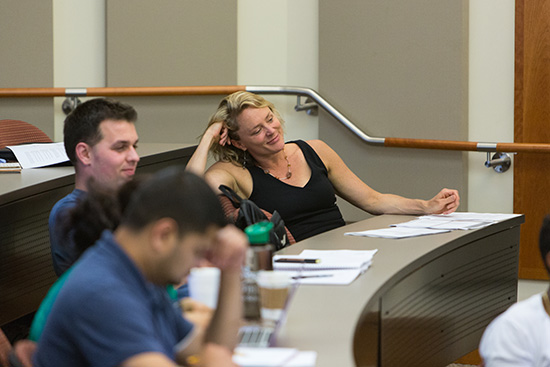The Irish in Boston, in Song, Literature, and Politics
Interdisciplinary class finds parallels to today's immigrant groups

Classroom guests Josie Coyne (from left), Rory Coyne, and John Coyne give students in The Irish in Boston course a taste of Irish music. Photos by Mike Spencer
“You get on a boat, and you have nothing, but you still have tunes in your head,” says Sally K. Sommers Smith.
She’s telling students in the course The Irish in Boston about the way Irish immigrants arrived in Boston, beginning in the 19th century, with few possessions, but a rich culture they worked fiercely to keep alive through music, poetry, and literature—not to mention politics.
Sommers Smith, a College of General Studies associate professor of natural sciences and mathematics, is one of four CGS faculty who together were teaching the new interdisciplinary course. And while she generally teaches in her fields, for this course Sommers Smith was drawing on her second specialty, Irish music, which she studies as well as performs on the fiddle. “I daresay I’m much better known in the academic world for my work on Irish and Canadian traditional music than I am for my studies in developmental biology,” she tells students.
The summer course charted the numerous ways Irish immigrants transformed the city’s political, economic, cultural, and literary landscapes during the late 19th and early 20th century. It was divided into four sections—Boston-Irish Politics (with a particular emphasis on the career of John F. Kennedy), Writing and Performance: Boston, Work, and the Irish Immigrant Experience, Irish Music in Boston, 1880-1990, and Irish Poetry in Boston, with a focus on works by Nobel laureate Seamus Heaney. Classes featured readings and discussions as well as visits from fiddlers and pipers, contemporary poets, and Boston-based Irish playwright Ronan Noone (GRS’01).
“The music is the voice of the Irish people, the diaspora,” Sommers Smith says. “It’s the voice of history and aspiration, and it needs to be listened to not just for its own qualities, but for the fact that this is an important voice in understanding the Irish as a people and Ireland as a nation, and what Irish people brought with them when they came to Boston.”
For students from more recent immigrant populations, there’s an “additional richness they can gain from seeing how similar their predicaments are to immigrant Irish,” says course instructor Meg Tyler (GRS’04), an associate professor of humanities and chair of the Institute for the Study of Irish Culture at BU. They are all “coming into this community from a close-knit and rather homogenous society, as Ireland is, where the flavors of religion are not as numerous as they are here, where the traditional constraints seem far more visible to me than they are in American culture.”
“There’s a looseness and a laxity here that I quite love, but it seems to me that the Irish, like other immigrant communities, needed to define some kind of anchor once they came across the sea,” she says. “And they found that by resurrecting their traditions on this side of the big drink.”

The course is “not just rah-rah for the Irish,” notes another of the course teachers, Megan Sullivan, an associate professor of rhetoric. Students also tackled topics like the priest abuse scandal. Noone visited the class and discussed his play The Lepers of Baile Baiste, which focuses on the clergy scandal in Ireland. “They made the connection” to what happened here, says Sullivan, director of the CGS Center for Interdisciplinary Teaching and Learning.
During the course’s six-week run, Tyler focused on poetry, Sullivan on drama and prose, and Sommers Smith on Irish music in Boston, while Thomas Whalen, an associate professor of social sciences, examined how Irish immigrants altered the city’s politics.
The course attracted 15 mostly nontraditional students, many from Metropolitan College, some products of immigrant cultures that are currently redefining the political and cultural life of the city and the nation.
“Here we are talking about an immigrant group trying to get a foothold in American society in the face of hostile opposition,” says Whalen, “and here we have the children of immigrants trying to do the same thing, in a climate that frankly isn’t exactly friendly to immigrants.”
“I can easily make a connection between my life and the experiences the Irish went through,” says Julio Flores (MET’16), a native of El Salvador who came to Boston in 2003 at age 19. He took the course to fulfill a humanities requirement, but it has given him “a better appreciation for my own heritage,” he says.
“Today, the public’s perception of Latinos is similar to the public’s perception of Irish immigrants before the Civil War,” Flores says. “People in Boston were not very friendly toward the massive immigration coming from Ireland. The Irish immigrants were seen as incompetent and ignorant people. However, the Irish immigrants created a path for ‘the newcomers’ to follow. They have showed that in America, all dreams can be achieved.”
Whalen agrees. “What happened with the Irish reminds me of what’s happening with the Latinos in the United States,” he says. “They’re on the cusp of gaining major political power, just as the Irish did in the 20th century.” Whalen, author of JFK and His Enemies: A Portrait of Power (Rowman & Littlefield, 2014) and A Higher Purpose: Profiles in Presidential Courage (Ivan R. Dee, 2007), notes that Irish politicians like the Kennedys and the late US Congressman and House Speaker Thomas P. “Tip” O’Neill had to fight for their power. The Irish said, “We’re not accepted by the establishment, so we’re going to have to take over the system.”
“As the son of Irish immigrants and a first generation college student, this class proved meaningful to me in many ways,” says Patrick Moriarty (CAS’15), whose father, James, was one of the musicians who performed in class, offering “Paddy’s Lament” on the accordion. “With the Irish identity trending in Boston for as long as I remember, the course demonstrated to me that this was not always the case. My parents were lucky to immigrate when they did.”
Timothy Ney, a nondegree student who signed up for the course because he was interested in the topic, says it provided unexpected insights into the city’s history and the way it connects us to the present. One of the required readings, See You at the Hall: Boston’s Golden Era of Irish Music and Dance, chronicles the Irish clubs in Dorchester and Irish dance halls in Dudley Square during the middle of the 20th century.
“I am making a documentary on hip-hop dance at the Dorchester Youth Collaborative in Fields Corner,” Ney says, “and I was surprised to learn that the same neighborhood was home to the All-Irish Music Club at Emery Hall and Arcadia Hall in the late 1930s.”
Faculty members hope to offer The Irish in Boston again next summer.
Comments & Discussion
Boston University moderates comments to facilitate an informed, substantive, civil conversation. Abusive, profane, self-promotional, misleading, incoherent or off-topic comments will be rejected. Moderators are staffed during regular business hours (EST) and can only accept comments written in English. Statistics or facts must include a citation or a link to the citation.